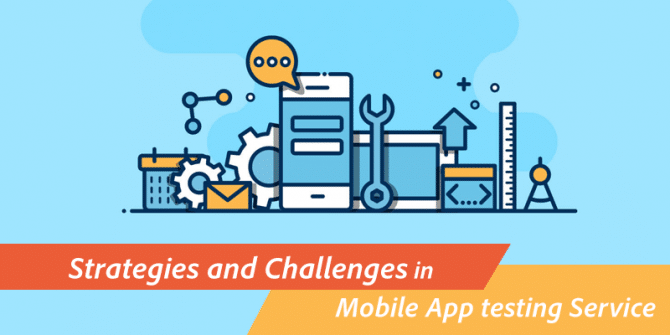
In this contemporary world, mobiles have become an integral part of our life, and it’s unimaginable to think of a life without it. Mobiles have gained an invincible space in the lives of humans and have evolved considerably faster than expected. According to an estimate, there will be about 5.5 Billion mobile users by 2020, which accounts for about 70 percent of the total world population. The mobile apps have portrayed an absolutely remarkable role in its monumental popularity. Today, we possess all kinds of mobile apps to perform almost every chore of our daily routine. In addition, businesses are increasingly finding it necessary to have an application to remain relevant and connected with their users. The usability and necessity of mobile apps have made it very essential to keep these flawless. The increase in app usage, followed by rapid mobile app development, has given birth to a critical need for a proper app testing process.
In the current scenario, it’s mandatory to implement the appropriate strategies during application development by recognizing the challenges an app can face in the real world. In this article, we are going to discuss some highly considerable challenges and strategies in mobile app testing process. Let’s first start with the challenges and then we will move towards strategies to overcome them.
Challenges In Mobile App Testing Services:
1.
App Performance And User Experience Issues:
The success of any mobile app is directly connected with the kind of user experience it provides to the users. An innovative, contextually appropriate and pre-defined user interface along with faster and uninterrupted performance impacts the preference of users. Bug-free apps with top-notch performance can easily convince your target consumers to download your application. Most users grades and rates the app on the basis of performance and experience delivered by it. This produces a direct effect on your app business because many new users choose applications based on previous reviews and ratings. Hence, an error or bug-free app along with the right user experience remain compelling factors to make that app sustainable in the market. Moreover, one must keep upgrading and improving the app to ensure users never consider leaving.
2.
Device Fragmentation:
Today, there are more than 24000 different types of Android devices (let alone iOS devices) available in the market, having different sizes, shapes, hardware, and software, posing a completely new set of challenges for the testers. The number includes all kinds of Mobile Phones, Pads, Tablets, Wearable tech and many more. This vast array of the devices has made it tougher for any quality team of testers to assure singular user experience and performance of the app, across different platforms, devices, and operating systems.
3.
Security:
Many personal and critical data are stored on the apps, so it’s highly crucial to provide the data privacy features in the apps. Testing the apps on the secure and the private cloud reduces the chance of data breaches and it also helps in recognizing security issues faster. Fixing problems before the production or the release of the app saves you a lot of money. According to an estimate, one can save 20 times the cost by fixing a bug before release than after the release.
4.
Too many Testing Tools:
Currently, there are excessive numbers of testing tools in the market, making it very hard to choose from. Most of the time we try searching for a tool that can handle all the mobile automation testing processes. But the fact is, there is no single tool that can satisfy all your testing needs. Each and every tool, either paid or open source, have their own limitations. Hence, it becomes imperative to have a sound strategy to prioritize your needs, totally based upon your understanding.
5.
Different Types Of Mobile Apps:
There are three currently available – Native, Web-based or Hybrid. As the implementation of these three apps is different from each other, their test case scenarios equally vary from one another. The differences are more evident while executing performance, stress, compatibility, and conformance testing. Native applications have lesser scope for testing, whereas, hybrid and web apps require both on and off platform testing. Web Apps primarily needs to be tested on the choice of browser versions, while Native and Hybrid apps require testing for execution, download, compatibility, platform interaction, and updates.
Here, I am wrapping up the challenges associated with the App Testing, and now, let’s jump to the strategies, which are must to overcome the challenges experienced in the mobile app testing.

Strategies For Mobile App Testing Services
1.
Device Matrix:
This is a significant factor because the selection of the testing device is made on the basis of the behavior of the target audience. By analyzing the market research, it becomes easier to determine the set of devices and Operating Systems that will have the highest occurrence. For Example — if the App supports both Android and iOS, but most of the users in your target market are using Android Devices like — Samsung, Google Nexus and Moto G devices and very few iPhones, then you can prioritize testing on the Google Nexus and Moto G above the iPhone device. In this scenario, the test plan will consist of testing on devices which are prioritized by your market analysis.
2.
Selection Of Emulators Or Physical Device:
One of the critical factors related to mobile app testing is the platform in which the testing will be performed. Whether the platform should be a physical device or an emulator depends upon nature of the test which needs to be carried out. Emulators can be utilized for user interface testing, and physical devices are most suitable for performance testing. Emulators can also be used to improve the cost-effectiveness of mobile app testing. There is no generalized opinion on which one is best for mobile app testing. Hence, it’s better to introspect the complete project and analyze the nature of testing required for it.
3.
Selection Of Cloud Or In-House Testing:
There must be a strategy to choose among Cloud or In-House Testing based on the testing requirements. Most of the time, we think that cloud testing is the best option, but we must understand that in-house solutions are handy for special requirements. The cloud is a useful tool to meet the need for mobility and teams located all over the world. Also, testing in the cloud can overcome obstacles like acquiring and maintaining many devices, as well as accessing the device pool from different locations. On the other hand, an in-house solution is more adaptable to individual needs – making it a perfect solution for companies that need an extra security layer and doesn’t want data to leave the office. It must be noted that due to the storage space limitation, the device choice will be limited.
4.
Prioritize The Security Of The App:
Security is one of the crucial factors which decides the success of any mobile app. The security breaches through mobile apps have cost Billions to users from all over the world. Due to this, modern-day users refrain from using apps having weaker security. Thus, the testing regime for a mobile app should also include security testing and methods such as static and dynamic analyzing test must be conducted to identify loopholes in the existing security architecture of the mobile app. To ensure a robust security mechanism, testing should also try to locate various vulnerabilities present in the app.

